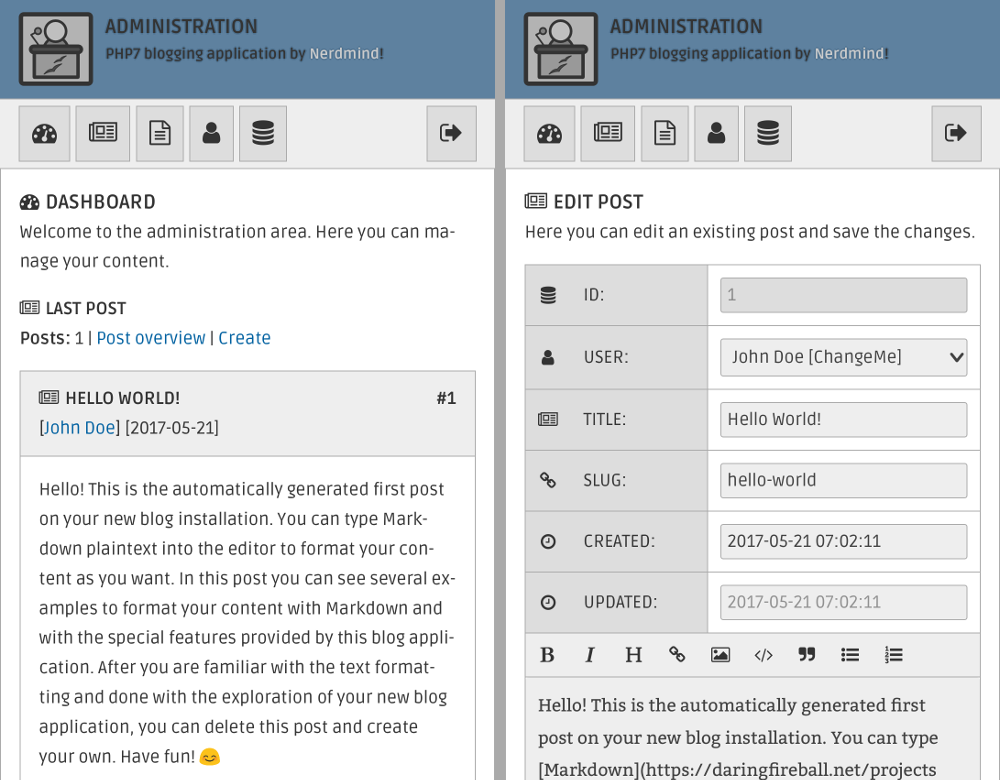diff options
| author | Thomas Lange <code@nerdmind.de> | 2019-04-26 21:10:33 +0200 |
|---|---|---|
| committer | Thomas Lange <code@nerdmind.de> | 2019-04-26 21:10:33 +0200 |
| commit | afcfaeb2bc7bbe1b278dab78e92d06026b4726e1 (patch) | |
| tree | 159417c9d6e1b8848b79c65b32b198f57bd0a601 | |
| parent | 33794b12d5c68df918b988497a396b86acb09feb (diff) | |
| download | blog-afcfaeb2bc7bbe1b278dab78e92d06026b4726e1.tar.gz blog-afcfaeb2bc7bbe1b278dab78e92d06026b4726e1.tar.xz blog-afcfaeb2bc7bbe1b278dab78e92d06026b4726e1.zip | |
Replace term "template" with "theme"
| -rw-r--r-- | database.sql | 2 | ||||
| -rw-r--r-- | readme.md | 4 |
2 files changed, 3 insertions, 3 deletions
diff --git a/database.sql b/database.sql index 734dce7..3ff1063 100644 --- a/database.sql +++ b/database.sql @@ -46,7 +46,7 @@ CREATE TABLE `user` ( -- Insert demo page, post and user -- ============================================================================= INSERT INTO `page` (`id`, `time_insert`, `time_update`, `user`, `slug`, `name`, `body`, `argv`) VALUES -(1, CURRENT_TIMESTAMP, CURRENT_TIMESTAMP, 1, 'example-page', 'Example Page', 'OK. You discovered that there is also a page functionality. But what is the difference between a **page** and a **post**? This is simple: There is not really much difference. But you can style posts and pages within the templates CSS completely independent from each other. For example, use **pages** for things like your imprint, your terms of use, your FAQ or other stuff. And **posts** for your main blog posts. A **page** (and also a **user**) has exactly the same functionality as already described within the [first post]({POST[1]})! 8)', NULL); +(1, CURRENT_TIMESTAMP, CURRENT_TIMESTAMP, 1, 'example-page', 'Example Page', 'OK. You discovered that there is also a page functionality. But what is the difference between a **page** and a **post**? This is simple: There is not really much difference. But you can style posts and pages within the themes CSS completely independent from each other. For example, use **pages** for things like your imprint, your terms of use, your FAQ or other stuff. And **posts** for your main blog posts. A **page** (and also a **user**) has exactly the same functionality as already described within the [first post]({POST[1]})! 8)', NULL); INSERT INTO `post` (`id`, `time_insert`, `time_update`, `user`, `slug`, `name`, `body`, `argv`) VALUES (1, CURRENT_TIMESTAMP, CURRENT_TIMESTAMP, 1, 'hello-world', 'Hello World!', 'Hello! This is the automatically generated first post on your new blog installation. You can type [Markdown](https://daringfireball.net/projects/markdown/) plaintext into the editor to format your content like you want.\r\n\r\nIn this post you can see several examples to [format your content with Markdown](https://daringfireball.net/projects/markdown/syntax) and with the *special codes* provided by this blog application. After you are familiar with the text formatting and done with the exploration of your new blog application, you can delete this post and create your own one. 😃\r\n\r\n\r\n\r\n## Dynamic internal URLs for items\r\nIf you want to link an item, please do not put the URL to the item hardcoded into your content! What if you want to change your sites address (or the base directory) in the future? Then you have to change all internal links in your content. This is not cool!\r\n\r\nTherefore, you can use the following code **without spaces between the braces** by knowing the unique ID of an item to link it dynamically:\r\n\r\n1. Example: `{ POST[1] }` \r\n{POST[1]}\r\n\r\n2. Example: `{ PAGE[1] }` \r\n{PAGE[1]}\r\n\r\n3. Example: `{ USER[1] }` \r\n{USER[1]}\r\n\r\n## Dynamic internal URLs for other resources\r\nThis also applies to any other resource that exists in the blog system and that you want to link to! You can link any other resource dynamically either relative to your base directory or relative to your resource directory (`/rsrc/`) for static files:\r\n\r\n* Example: `{ BASE[\"foo/bar/\"] }` \r\n{BASE[\"foo/bar/\"]}\r\n\r\n* Example: `{ FILE[\"foo/bar/\"] }` \r\n{FILE[\"foo/bar/\"]}', NULL); INSERT INTO `user` (`id`, `time_insert`, `time_update`, `slug`, `username`, `password`, `fullname`, `mailaddr`, `body`, `argv`) VALUES @@ -1,7 +1,7 @@ # PHP7 blogging application -Easy blogging application written with PHP7! The application comes with a fulltext search functionality for posts and with customizable templates and languages. You can build your own template if the default template does not satisfy you. +Easy blogging application written with PHP7! The application comes with a fulltext search functionality for posts and with customizable themes and languages. You can build your own theme if the default theme does not satisfy you. - + ## Administration interface  |
